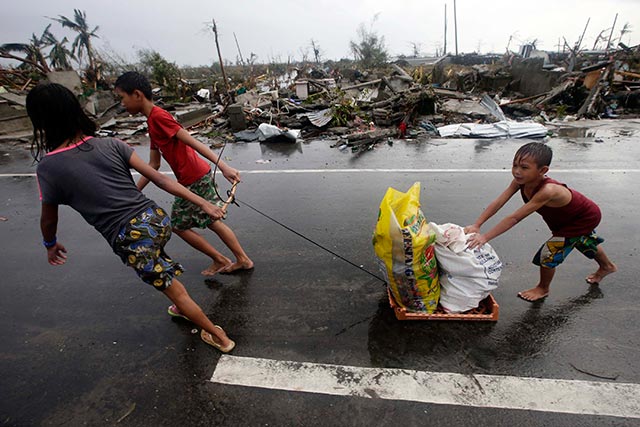My destination sits under a large sign bearing the words 'HIỆP PHÁT'. It is a small storefront piled high with boxes of soda, toothbrushes, and squid-flavored potato chips. An old Vietnamese woman sits at the counter. She's well dressed in bright traditional clothes, with gold bracelets on her wrists and elegant jade earrings. I grab a bottle of tea from the refrigerator, place it on the counter in front of her. I reach for my wallet and she laughs as she produces a bag full of home-cooked food from beneath her stool. Then she reaches around for gum, candy, cigarettes - anything handy, really - and tosses it in the bag.
I stand there like an idiot, smiling and brandishing a fistful of bills, muttering cam on ('thank you' in Vietnamese) again and again. She ignores the money, and eventually I give up and mutter cam on even more emphatically than before. Then I trudge back across the street, clutching my free lunch and spitting obscenities at the buzzing motorbikes.
This has been going on for months. It is one of my most baffling experiences in Vietnam.
 |
| The Lunch Lady. |
There is a certain art to buying things in Vietnam, especially foodstuffs. Consistency is paramount.As an illustration - the neighborhood sandwich shop. Every morning, I stop there between 10-12 am to buy two banh mi op la (omelet baguettes). The process is incredibly efficient. As soon as the woman hears my motorbike approach, she cranks on the gas range and begins cooking the eggs. I park my bike in front of her cart, and wander off to buy fruit and coffee. By the time I return, she has wrapped two steaming sandwiches in old book pages. I climb on my bike, she clips the food to my bag, and I hand her 25,000 VND ($1.25 USD). We do this every day. We have the routine down pat.
However, should I deviate from the routine by ordering, say, one sandwich, the transaction devolves into utter chaos. All the painstaking familiarity gained over weeks and months suddenly evaporates and I am reduced to holding up fingers and pointing at loaves with the authority of an indecisive toddler. Eventually she concedes and makes the sandwich, eying me mistrustfully the whole time and staring at my money like it is made of human skin. This scene will repeat itself over the next week or so, until I regain enough credibility to qualify for automatic, expedited service.
Now some might say, 'Nick, this problem could be easily resolved if you simply acquired a working knowledge of basic Vietnamese.'
This is true.
But Vietnamese is hard.
This is true.
But Vietnamese is hard.
~
For the first three months I lived in Vietnam, I had a similar breezy routine with the Lunch Lady. On weekday afternoons I would pull up just before 6 pm, always buying a small Coke. On weekends I stopped by around noon for a green tea, carrying my customary lunch of com chien (fried rice) in a yellow plastic bag. Occasionally I'd buy some ChocoPies or squid chips for a particularly good class, which were always fetched by the Lunch Lady's teenage son, whose facial expressions ranged from intolerably bored to possibly comatose. We had a polite and uncomplicated relationship - take goods, give money, repeat as necessary.
One day, I noticed a small flower shop half a block from the HIỆP PHÁT. For reasons inexplicable considering my 5 am wakeup that day, I was in a lighthearted, gift-giving mood. So I bought a bunch of flowers and brought them over to the Lunch Lady. I stepped into her store and handed her the bouquet of rich purple…somethings. They matched her outfit that day, and I made a big show of saying 'dep, dep!', meaning 'beautiful' in Vietnamese. She blushed furiously and placed the flowers in a vase next to the cash register. She wouldn't let me pay for the tea. I silently congratulated myself for being an awesome human being and headed back to school, where I would go on to blatantly mail in my last two lessons with the help of pirated Doraemon DVDs.
The next Saturday, the com ga restaurant where I bought lunch had disappeared. Everything from the deep fat fryer to the sign outside were gone. When I appeared at the for HIỆP PHÁT for my tea, the Lunch Lady immediately noticed the absence of my little yellow bag. 'Com? Com?', she asked again and again, repeating one of the only Vietnamese words I was likely to understand. I gave her the double upturned handshake, the ubiquitous local sign for 'I am absolutely clueless.'
After that, the Lunch Lady was born.
~
 |
| The first offering. |
The first time she made me lunch, I was flabbergasted. It was a Saturday afternoon, around the usual time, and I had shown up more out of habit than anything else. I was planning on skipping lunch and binging on Indian food that night. So when the cute old lady handed me a bag full of freshly sautéed beef and vegetables, steamed white rice and (peeled!*) apples, I could do nothing but stammer 'thank you', unable to utter even a single word in Vietnamese. When I tried to produce my wallet, she unleashed a torrent of Vietnamese that admonished me, in no uncertain terms, for being a complete fucking idiot. Her actions completely subverted everything I previously understood about the business-customer relationship. I gave her a polite little bow, remembered that the Vietnamese don't bow, got even more embarrassed, and practically sprinted out of the store.
Bewildered and slightly hungry, I wandered back to the teacher's room and unpacked my grub. Ms. Ngu, one of the teacher support staff and possibly the sweetest human being ever born, looked confused and asked me if I had made lunch at home (since foreigners are generally assumed to subsist only off KFC and Heineken). When I told her it was a gift from the woman across the street, Ngu looked at me as if I was speaking Flemish. 'Foreigners are just the weirdest,' her face said plainly.
 |
| Better than a Famous Bowl, probably. |
The same thing happened next week. Suddenly, my money was useless at the HIỆP PHÁT. Since she wouldn't accept money, I began to search the city for little gifts to give her. As the weeks passed and the free lunches continued to flow, it turned into a bit of a game. Every weekend she would deliver a fresh batch of com with all the fixin's, and I'd deliver a little glass figurine or another bouquet of flowers.
 |
| Step 1 to becoming a fatass. |
Every week was something different. Once she handed me a heavy box of fried rice with a dozen giant shrimp buried under the fragrant grains. Another Saturday's bag contained an assorted sampler of Vietnam's finest processed meats, which I delicately disposed of in an outside bin to keep it from smelling up the entire office. My lunches began to attract attention from coworkers, who teased me that I now had a new girlfriend across the street. Even the normally reserved Ms. Ngu tossed words like 'seduction' around, which was equal parts hilarious and horrifying. Others suggested that perhaps she had a daughter she wished to marry off, though I never saw anyone but her expressionless son hanging around the store.
 |
| The gift war escalates. |
Then the gifts began to come. For weeks I had been bringing her little trinkets and gifts, considering it a utilitarian trade of art for food. She placed them together on the counter, a steadily growing little pile of gratitude and guilt. I felt a very Midwestern need to be 'even' - something in Minnesotan blood curdles at the idea of being out-generous'd by somebody else. My father is a prime example of this - if the man borrowed your car for an hour, he'd return it with a full tank of gas, new brakes, and a copy of CCR's Greatest Hits. The gifts were my way of compensating for the time and energy she put into my weekly lunches.
When the food began to be accompanied by fashion accessories, I felt a twinge of panic. Things were beginning to escalate quickly - they could easily get out of hand fast. One week she gave me two beautifully wrapped boxes containing a leather wallet and belt. The next there was a silver watch nestled in a dark red box. Some other notables - a backpack filled with a motorbike helmet, poncho, and face mask, a traditional Vietnamese wind chime, an entire carton of cigarettes, and the coup de grace:
 |
| verysexyhot, baby! |
At this point, I was afraid to even walk into her store. Merchants in Vietnam are usually ready to gouge foreigners to the utter limits of reason - my favorite example being a woman who once tried to charge me 500,000 VND ($25 USD) for a single coconut. People don't simply give stuff away, especially to foreigners who make comparatively exorbitant salaries. And storeowners never, never lavish expensive gifts on their customers while refusing to accept payment. A coworker joked that not only did she want me to marry her daughter, but also donate a kidney to her cousin. I laughed along with him and patted my sides nervously.
One day, there was a light blue envelope inside my lunch bag. I opened it to find a beautifully written note, full of curly T's and elegant sweeping G's. The Vietnamese still practice handwriting in school, and reading their letters sometimes feels like studying calligraphy. In polite, formal English, the note informed me that that the lady had asked a niece to translate her words; the condensed version read something like this:
Every day I see you at my store and I feel happy. Your smiling face is very handsome and you have a kind heart. It must be difficult for you to live far from your family and homeland. I hope that you will remember me, and have a happy life in Vietnam.How do you reply to that?
~
I eventually wrote the Lunch Lady back, enlisting my talented coworker Ms. Phuc to translate my letter into Vietnamese. Phuc is a bit of a smartass - apparently she majored in literature or poetry or something while in university, and is thus a talented writer. 'How do you want the letter to sound? Polite? Respectful? Grateful? Romantic?', she asked, winking suggestively at the last one. I settled on grateful and polite, and began the difficult task of thanking someone whose kindness has exceeded all reasonable expectations.
In the end I have no idea if I found the right words to show my gratitude (or if Phuc ignored my instructions and wrote a steamy ode of lascivious dirty talk). But we've exchanged a few more notes since then, and the stream of food and gifts continues unabated, always in both directions, never entirely equal.
I'll never know exactly why she decided to show such kindness to a clueless, lunchless foreigner with long hair and lousy taste in cosmetics, but I am comfortable with not-knowing. Vietnam teaches you very quickly that some questions are not meant to be answered. A little mystery keeps things interesting. And everybody knows there's no such thing as a bad free lunch.
Although if she ever packs me squid rings again, I might torch the shop.

































.jpg)

